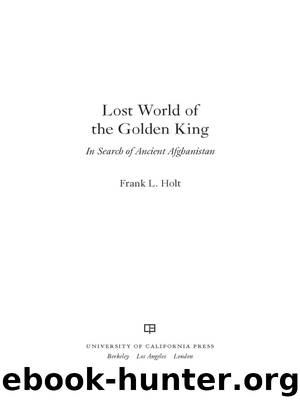Lost World of the Golden King by Holt Frank L.;

Author:Holt, Frank L.;
Language: eng
Format: epub
Publisher: University of California Press
CHAPTER NINE
Coins and the Collapse of Civilization
Cognitive Numismatics II
In the autumn of 1962, a freshly plowed field in the town of Rawa Mazowiecka yielded an unexpected find.1 Near the picturesque castle ruins, a silver drachm minted over two millennia earlier in Afghanistan emerged incongruously from the soil of central Poland.2 No one knows how this coin of Menander I Soter got there, or when—such are the mysterious travels of money.3 But in its movements beyond the mint, a coin like this reflects additional human behaviors besides those of its makers, from transporting, spending, losing, hoarding, defacing, reissuing, wearing, imitating, and counterfeiting to collecting and perhaps studying. There are even some nonhuman behaviors that may come into play, such as the Suffolk chicken that carried around an ancient gold coin in its crop having mistaken it for a kernel of corn.4 These are all links in the chaîne opératoire that might take an artifact from mine to mint to market to museum. In these last steps, too, scholars may glimpse the ancient world that bustled below the Bactrian king list.
When a bronze or cupronickel coin left its mint, it tended to circulate nearby, since its extrinsic value depended on local conventions.5 This was the medium for most daily business—the small change of the regional economy. Hellenistic hoards of bronze coinages are therefore very rare; household savings normally took the form of silver and sometimes gold. As official conduits to the masses, the ability of token money to reach down into the poorest levels of society was seldom fully utilized. For quite some time, fiduciary currency in Bactria kept its messages plain and simple, forgoing royal portraits, fancy titles, and commemorations. Instead, bronzes usually showed deities rather than kings, along with totem animals and objects (fig. 22). Some of these designs had specifically local significance.6 In time, it was on this low-denomination currency that the state generally acknowledged the importance of native cultures in terms of local scripts, square shapes, and non-Greek deities.
Large-denomination silver and gold mintages, on the other hand, appeared more obviously royal and more steadfastly Greek; they held their intrinsic value over great distances and were as acceptable in Syria as in Central Asia. Bactria's mints pounded out more tetradrachms than anything else. (The Indo-Greek mints produced more drachms.) This silver's first stop was normally in the hands of soldiers, suppliers, and various state officials. Indeed, most Hellenistic economies were military in nature, and the striking of coinage in sudden surges usually betokens a war.7 Coins would then trickle through the markets and banks, and sometimes return to the state treasury as payments for tolls and taxes. As tetradrachms slowly wore out (at about a rate of 5–18 milligrams per year), the state treasury would hold them back for remelting and restriking.8 Along the way, some coins became immobilized in hoards, as random losses, or as something other than currency—such as jewelry. Those coins that eventually escaped the melting pot might be collected and studied millennia later by a Bayer or Bopearachchi.
Download
This site does not store any files on its server. We only index and link to content provided by other sites. Please contact the content providers to delete copyright contents if any and email us, we'll remove relevant links or contents immediately.
| Africa | Americas |
| Arctic & Antarctica | Asia |
| Australia & Oceania | Europe |
| Middle East | Russia |
| United States | World |
| Ancient Civilizations | Military |
| Historical Study & Educational Resources |
Empire of the Sikhs by Patwant Singh(23073)
The Wind in My Hair by Masih Alinejad(5092)
Rise and Kill First by Ronen Bergman(4779)
The Templars by Dan Jones(4682)
The Rape of Nanking by Iris Chang(4203)
12 Strong by Doug Stanton(3541)
Blood and Sand by Alex Von Tunzelmann(3195)
Babylon's Ark by Lawrence Anthony(2672)
The History of Jihad: From Muhammad to ISIS by Spencer Robert(2620)
No Room for Small Dreams by Shimon Peres(2365)
The Turkish Psychedelic Explosion by Daniel Spicer(2354)
Inside the Middle East by Avi Melamed(2352)
Gideon's Spies: The Secret History of the Mossad by Gordon Thomas(2342)
Arabs by Eugene Rogan(2292)
The First Muslim The Story of Muhammad by Lesley Hazleton(2267)
Come, Tell Me How You Live by Mallowan Agatha Christie(2253)
Bus on Jaffa Road by Mike Kelly(2150)
Kabul 1841-42: Battle Story by Edmund Yorke(2025)
1453 by Roger Crowley(2022)
